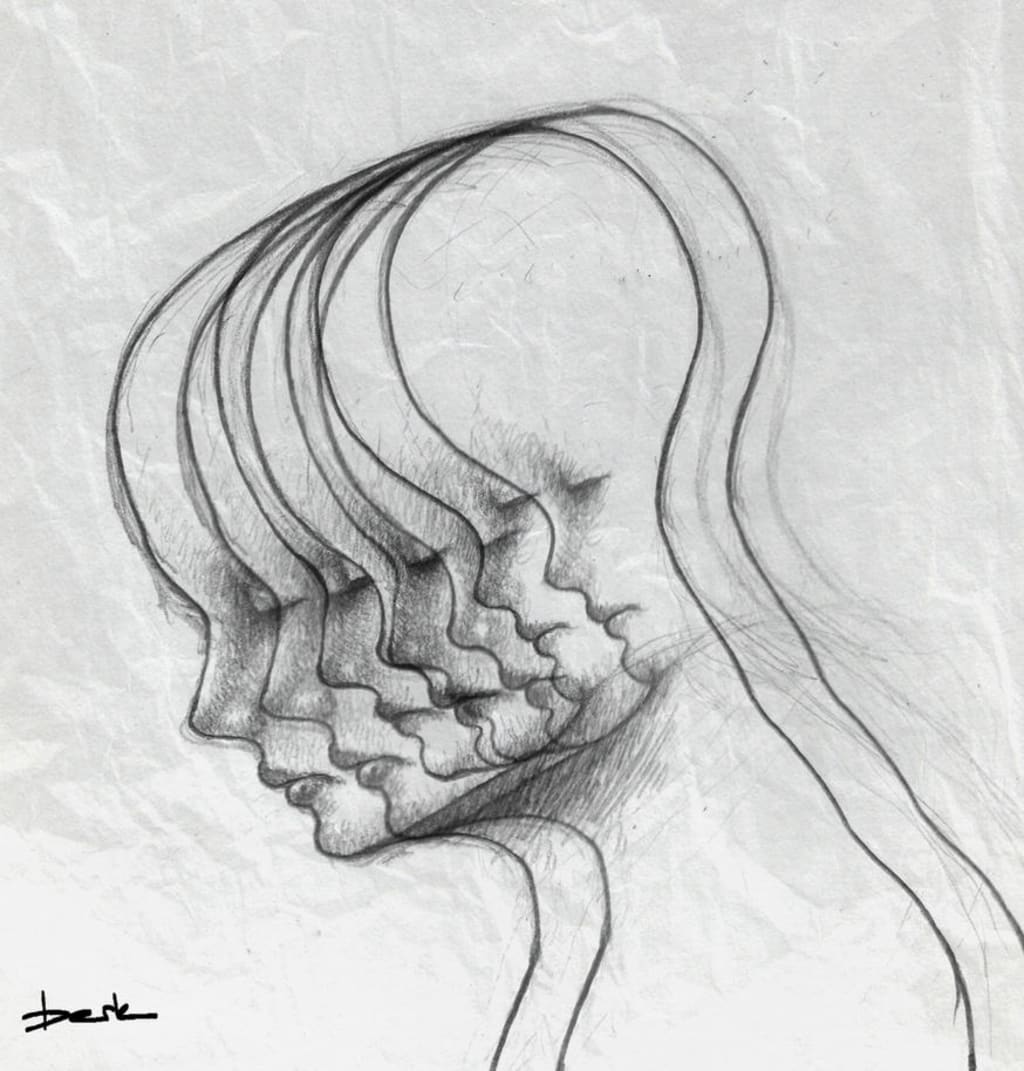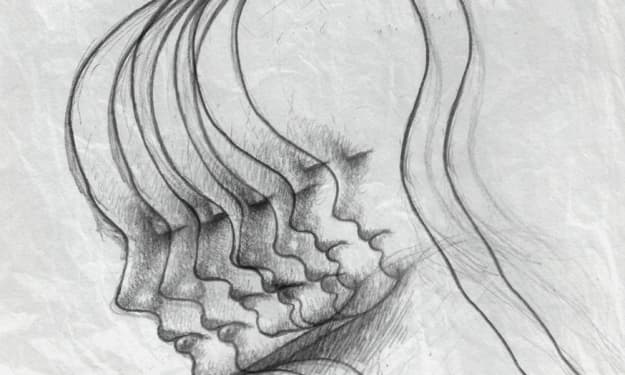
TW: Talk of su!cide, ED, and SA
"Borderline personality disorder (BPD), also known as emotionally unstable personality disorder (EUPD), is a personality disorder characterized by a long-term pattern of unstable interpersonal relationships, distorted sense of self, and strong emotional reactions"(Wikipedia).
Now, I could just give you the Wikipedia version of what BPD is and call it a day, because why would you care about what BPD is and how it affects my daily life? Also, who the hell still uses Wikipedia as their main research source? Maybe you really don't care, or you just happened to tumble across this article and think 'listen to this sad sack of shit'. Either way, I've decided to write about my experience with BPD to help a mother understand, a fellow borderline feel that their experiences are valid and not crazy, and honestly, to allow myself to rant hoping that someone will actually give a shit. Before I start, I want to take the time to let you know that this is a very heavy topic, I will be talking about things I've struggled with personally. If you have the tendency to judge, please save yourself the ten minutes it will take to read this and carry on with your day.
Growing up I was always shy, I still am. I'd rather work by myself than in a group, I never spark up conversation or try to make myself seen and I NEVER talk in front of crowds. Throughout my first 12 years of life everything was great, I played travel basketball, had amazing grades and a personal relationship with almost all of my teachers, had a close group of friends and an amazing family. I was generally happy with my life, everything felt perfect, well, as perfect as it could be for a 12-year-old. Don't you ever miss the worry-free times? When everything just made sense and Santa was still real? I had an amazing childhood, I have two loving parents, an extremely close family and everything I could have ever asked for. I was loved, that's all a child really needs to succeed in life, love... and candy. Which I had plenty of.
So, what changed?
I have asked myself this question hundreds of times, and deep down I knew the answer. I just didn't want to admit it. Grade 8-10 I was in an abusive relationship, this is where my life began crumbling down. Now you may be thinking to yourself "An abusive relationship at 13?! Yeah right, you two were just kids, you didn't know what sex was, let alone abuse!", and you're right. I did not realize I had been abused until I was about 15-16, when I learned about consent. You mean to tell me he was supposed to ask me every time? He was supposed to respect me when I said no? I had so many questions and not enough answers. After I was educated on consent and what abuse really was, everything started to piece together, I now knew. I was 13 when this all started, no 13-year-old should be begging their mother to put them on birth control because they are unknowingly sexually active.
Now, I could go on and on about that experience, but that's not what I am here to talk about, I am here to talk about BPD and the effects on my life. Why was that short sob story relevant to this discussion? Because you now know what the main cause of my diagnosis was. Unlike depression, bipolar, etc. BPD is not caused by a chemical imbalance in my brain, it is caused by learned behaviors from my childhood that has now developed into my personality. There is no 'magic pill' for BPD, you can go to therapy and pray you don't stay like this forever. Because BPD is LEARNED behaviors, you can also UNLEARN these behaviors. How do you unlearn these behaviors? CBT (Cognitive Behavior Therapy) and DBT (Dialectical Behavior Therapy) are your best bets, that and a shit ton of self-awareness.
How does BPD affect my life?
As some of you may know, having borderline personality disorder means my moods change faster and more frequent than I change my underwear (you may have a problem if you change your underwear more than 20 times a day). The slightest of things alter my mood and send me into wave of sadness that is impossible to explain, but I'll try my best. Something as small as cutting me off mid-sentence can send me into the spiral of 'they don't care what I have to say, I might as well keep my mouth shut'. Stupid, I know, but it is something I cannot help. Now the brightside to having BPD is that I'm going to bounce back and forget I was upset within the next twenty minutes. The best way to deal with this lovely symptom, is to know your triggers. Learning your triggers can be difficult as you aren't paying attention to what made you upset, you just know that you are upset. I'll write another story about learning your triggers, for now, some helpful advice: try to pay attention to the events leading up to what caused you to become distressed, find the patterns.
Fear of abandonment, an amazing side effect to BPD. You may notice in someone diagnosed with BPD that they will go to extreme measures to make sure they don't lose someone, we also need plenty of reassurance that you aren't going anywhere. In my own personal experience, if I feel that I am losing someone I result to self-destructive behaviors. These behaviors include isolating myself, cutting, putting myself through pain, or refusing to eat. It may sound silly or small, but in my mind, it feels like the only logical answer in that exact moment. What feels small to you, can feel huge to us.
Lack of self-identity is a big one for me personally, I don't know who I am. My identity changes every so often, one of the most common themes of my identity changes is mirroring someone I look up to. I don't have my own personality, so I slowly start to mirror others. This could be someone I'm dating, or a famous person I really like. If you're dating someone with BPD, you may find yourself thinking that this person is just like you, it is amazing because you're basically dating yourself! That my friends, is your fellow borderline mirroring your personality, and this may seem like it is an amazing thing, but you need to set boundaries.
What do I mean by setting boundaries? People with BPD tend to have a 'favorite person', this is the person that they are emotionally dependent on. Most of the time our favorite person is our spouse, we give all of our attention and time to our favorite person. Why is having a favorite person a bad thing? Because as I stated in the sentence above, we become emotionally dependent on them, they become the only important person in our lives, and we begin to create an anxious attachment style towards them. We want to spend every waking minute with them and become distressed when we are not able to do so. Creating boundaries is very important when you feel that you are someone's favorite person, you need to reassure them that you are not going anywhere but need somewhat of a separate life. Encouraging someone with BPD to hang out with their friends on their own and sometimes doing things separately is important, this helps create a boundary while also reassuring them you aren't going anywhere. Reassurance is key.
I'm going to quickly skim over a couple more symptoms before getting into the heavier stuff. We are going to talk about impulsive and risky behaviors and intense anger. People with BPD tend to have impulsive and risky behaviors, this can include impulsive spending habits, gambling, reckless driving, drug abuse, etc. We don't look deep into the consequences of some of our actions and often make decisions without really thinking about them, they just feel right in the moment. Intense anger is another common thing people with BPD struggle with, small disagreements can lead to bigger issues. Based on my personal experience, my anger mainly begins when someone does not understand me, most of my recent anger has been directed at my mother. It is very common for teenagers to fight with their parents, don't get me wrong, but it sometimes gets taken to another level without my knowledge that it is even happening. It almost feels as if I black out and don't remember anything I did, or said. Moments after these fights, I immediately regret it, but what good does that do when it's already been said and done? I appreciate my mother so much; I praise her for the amount of compassion and understanding she has towards my disorder. I can be a stubborn b!tch sometimes, but she understands, and I am forever grateful for that.
TW: Su!cidal behaviors and ideation
60-80% of people with BPD have attempted su!cide, 10-15% have been successful.
Before I met my love (bless his soul, he saved my life), su!cide was something that I often thought about. Heavy topic, I know, but it needs to be talked about. I use to dwell on the idea of not being here anymore. December 2021, I lost someone extremely close to me, I fell into a deep depression, refused to eat, and felt an internal pain that I thought would never go away. This is when my thoughts about su!cide shifted, I realized that death was a permanent thing. I reflected on the way that I felt after losing my best friend and understood that I couldn't put the people in my life through this pain twice. There is no undoing death, once you're gone, you're gone forever, and I couldn't imagine putting the people that love me through that amount of pain. A week after I lost one of the most important people in my life, I met my love. I'm not even kidding you when I say that he was an angel sent by my recently deceased friend, he gave me a reason to keep on pushing.
Listen to me when I tell you this, you are loved. Whether you believe it or not, there are people out there that love you and that couldn't live without you. I can tell you from lived experience that it does get better. I still have bad days, everyone does. Understand that the world is better with you in it.
Canada Suicide Prevention Hotline: 1-833-456-4566
Borderline personality disorder is a rollercoaster ride, I still haven't fully figured it out myself. If you or someone you know is struggling with BPD, reach out, we shouldn't be doing this alone.
If you or a loved one is struggling text 'WELLNESS' to 686868 (Youth) to speak to a mental health professional one on one. 741741 (Adults)
Thank you to my parents for all of the support, I know this is all new to you as it is to me, but I am thankful for the unconditional love and support you guys give to me.
And to my love, thank you for putting up with me and trying your hardest to understand. I love you with all of my heart and am so grateful for you. You've saved my life and I couldn't thank you enough.
About the Creator
Mack
My digital diary <3
Beginner






Comments
There are no comments for this story
Be the first to respond and start the conversation.